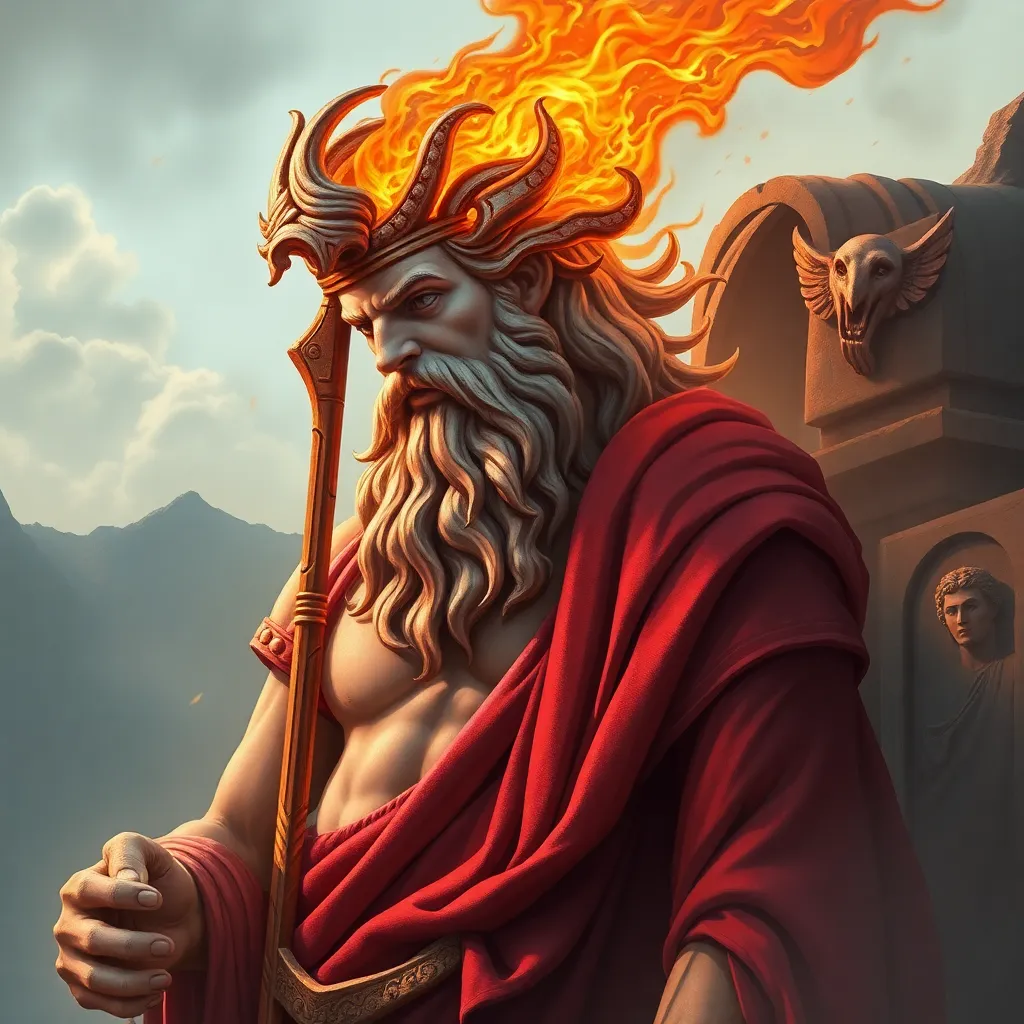The Myths of Hephaestus and His Relationships with Mortals
I. Introduction
Hephaestus, the Greek god of fire and craftsmanship, occupies a unique position in Greek mythology. Unlike many of his fellow Olympian gods, Hephaestus is often portrayed as a figure of resilience and ingenuity, embodying the spirit of creation through labor. His relationships with mortals are crucial to understanding his character and the themes of his myths.
This article aims to debunk certain myths surrounding Hephaestus while exploring the significance of his interactions with mortals. Through examining his origin, relationships, and contributions to both gods and humans, we can gain a clearer understanding of this complex deity.
II. Hephaestus: The God of Fire and Craftsmanship
Hephaestus is traditionally recognized as the god of fire, metalworking, and craftsmanship. His origins are steeped in myth, with various accounts detailing his birth and attributes. He is often depicted with a hammer, anvil, and tongs, signifying his role as a blacksmith.
- Origins: Hephaestus is said to be the son of Zeus and Hera in some traditions, while other accounts suggest he is solely the offspring of Hera, conceived without Zeus.
- Attributes: Hephaestus is characterized by his physical imperfections and craftsmanship skills, contrasting sharply with the beauty of other gods.
Among the Olympians, Hephaestus holds a significant role. As the divine craftsman, he creates magnificent weapons and artifacts for the gods, including:
- The shield of Achilles
- The armor of Heracles
- The throne of Zeus
His artistic skills and contributions to mythology illustrate the themes of creation and transformation, making him an essential figure in the pantheon.
III. The Myth of Hephaestus’s Birth and Exile
The narrative of Hephaestus’s birth is a tale of both tragedy and resilience. According to traditional myths, Hephaestus was born with a physical deformity, leading to his rejection by Hera, who cast him out of Olympus in disgust.
This rejection sets the stage for themes of abandonment and resilience in Hephaestus’s story. Exiled from his divine home, he fell into the sea, where he was nurtured by Thetis and Eurynome, eventually becoming a master craftsman.
His journey symbolizes the strength of overcoming adversity and the importance of finding one’s place in the world, even when faced with rejection from one’s own family.
IV. Hephaestus and Aphrodite: Love or Manipulation?
The marriage between Hephaestus and Aphrodite, the goddess of love and beauty, is one of the most intriguing aspects of his mythology. While Hephaestus loved Aphrodite deeply, their relationship was fraught with complexities.
Myths surrounding their marriage often depict it as a union of convenience rather than genuine affection. Aphrodite’s infidelity with Ares, the god of war, raises questions about the nature of their bond:
- Love: Hephaestus’s devotion to Aphrodite is evident in his creations for her, including the magical girdle that enhances her beauty.
- Manipulation: Aphrodite’s relationships with other gods suggest she may have exploited Hephaestus’s feelings for her own benefit.
This dynamic invites an examination of love versus manipulation, showcasing how power and vulnerability can coexist in relationships.
V. Hephaestus’s Interactions with Mortal Heroes
Hephaestus’s contributions extend beyond the divine realm; he is known for crafting weapons and tools for mortal heroes. These gifts often play pivotal roles in their quests and battles, illustrating the significance of divine craftsmanship in mortal affairs.
Some notable examples of Hephaestus’s interactions with heroes include:
- Achilles: Hephaestus forged the legendary shield of Achilles, which depicted scenes of the cosmos and human life, symbolizing the hero’s journey.
- Perseus: He created the winged sandals that allowed Perseus to defeat the Gorgon Medusa.
These relationships highlight the interconnectedness of divine craftsmanship and mortal fate, emphasizing how the gifts from gods can alter the course of human history.
VI. The Role of Hephaestus in Human Innovation
Hephaestus represents more than just a divine blacksmith; he embodies the spirit of innovation and creativity. His inventions often reflect the interplay between mythology and human progress.
Mythological examples of his inventions impacting mortals include:
- The automated servants that assisted him in his forge
- The bronze giant Talos, who guarded Crete
- Various magical weapons that shaped the fates of heroes
The symbolism of craftsmanship and technology in Hephaestus’s myths serves as a reminder of the human quest for knowledge and creation, inspiring countless artists and inventors throughout history.
VII. Misconceptions about Hephaestus’s Character
Hephaestus is often stereotyped as the ‘ugly’ god, marked by his physical imperfections. However, this portrayal oversimplifies his character and overlooks his complexities. While he faced challenges due to his appearance, Hephaestus’s character is rich with strength, vulnerability, and creativity.
Debunking myths about his bitterness and isolation reveals a more nuanced figure:
- Strength: Hephaestus’s ability to create exquisite works of art and technology demonstrates his inner strength.
- Vulnerability: His experiences of rejection and betrayal evoke empathy, adding depth to his character.
Hephaestus embodies the duality of strength and vulnerability, making him a relatable figure in mythology.
VIII. Conclusion
In summary, the myths of Hephaestus reveal a multifaceted character whose relationships with mortals are central to his narrative. From his origin story filled with themes of abandonment to his intricate relationship with Aphrodite and mortal heroes, Hephaestus’s legacy continues to resonate in contemporary culture and art.
The significance of Hephaestus’s interactions with mortals underscores the enduring impact of craftsmanship, innovation, and the human experience within the realm of mythology. His story serves as a timeless reminder of resilience, creativity, and the complex nature of relationships.




